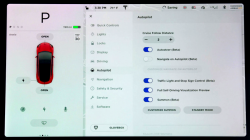
— A Tesla FSD (Full Self-Driving) class action lawsuit has been dismissed after a Tesla owner complained Tesla made deceptive and misleading statements about automated driving capabilities to New York customers.
The lawsuit alleges it was in October 2016 when Tesla announced “Full Self Driving Capability” was available for customers.
In December 2016, plaintiff Michael Nachman visited a Tesla dealership and met with a sales representative who helped him customize a car for purchase using Tesla’s website. The website advised that “[a]ll Tesla vehicles . . . have the hardware needed for full self-driving capability."
Included on the website was a video appearing to show a Tesla driving without a human driver.
The lawsuit also alleges the website advertised the FSD package as “enabling full self-driving in almost all circumstances,” while noting that “[i]t is not possible to know exactly when each element of the functionality described above will be available.”
The plaintiff argues he paid an extra $8,000 for a vehicle that was not capable of full self-driving. Then in October 2020, Tesla allegedly increased the FSD package cost and informed some current customers their cars would need a $1,000 hardware upgrade.
The plaintiff filed the Tesla FSD lawsuit in October 2022 by alleging false advertising and deceptive business practices caused New York Tesla customers to buy vehicles that were not FSD.
According to the class action lawsuit, Tesla vehicles equipped with Autopilot, Enhanced Autopilot or Full Self-Driving systems don't perform as advertised by Tesla.
Tesla FSD Lawsuit Dismissed
Tesla argued in its motion to dismiss the plaintiff waited to long to file his lawsuit, and an unjust enrichment claim should also be tossed because it is duplicative of the other claims.
According to the plaintiff, he was "injured" because he paid a premium price for a vehicle based on deceptive marketing.
However, according to the judge:
"But the three-year statute of limitations for Sections 349 or 350 claims based on that injury has run, because plaintiff made his purchase in December 2016, but did not file this lawsuit until October 2022."
The judge also found Tesla demanded additional money from “some owners” for hardware upgrades, but the plaintiff does not suggest he was among those owners. The plaintiff also does not claim he paid any additional money to Tesla for automated driving features after he bought the car.
"Defendants’ motion to dismiss is granted. Plaintiff’s claims under Sections 349 and 350 are time-barred, and plaintiff’s unjust enrichment claim is dismissed as duplicative of his other claims." — Judge Rachel P. Kovner
The Tesla FSD lawsuit was filed in the U.S. District Court for the Eastern District of New York (Central Islip): Michael Nachman v. Tesla, Inc., et al.
The plaintiff is represented by Reese LLP.




